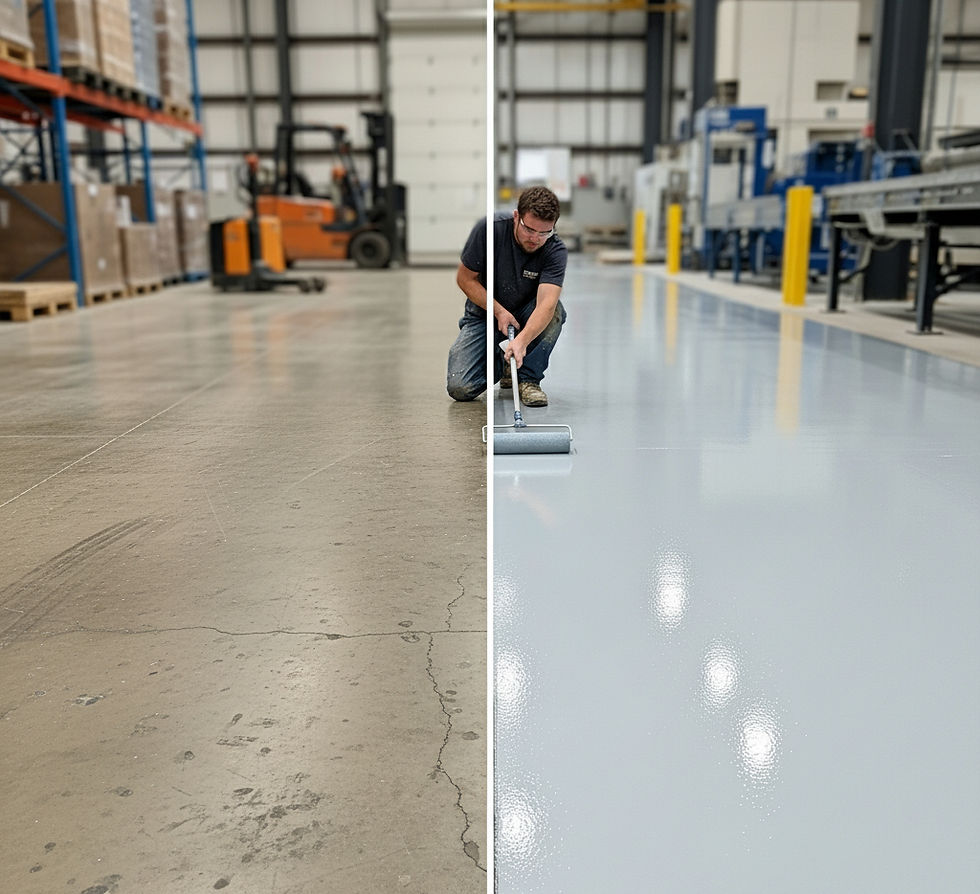Concrete Protection Products: Your Ultimate Guide to a Long-Lasting Surface
- Aug 28, 2025
- 4 min read
Concrete is a go-to building material for a reason—it’s durable, strong, and versatile. From driveways and garage floors to patios and decorative countertops, it forms the foundation of countless spaces. However, even the toughest concrete isn't invincible. Left exposed to the elements, heavy traffic, and everyday wear and tear, it can quickly show signs of deterioration like cracks, stains, and spalling.
This is where concrete protection products come in. Acting as a shield for your investment, these products are designed to enhance and preserve your concrete's lifespan and appearance. But with so many options available, how do you choose the right one for your needs?
This comprehensive guide breaks down the different types of concrete protection products, their benefits, and how to select the best solution for your next project.

Why Is Concrete Protection So Important?
Protecting your concrete isn't just about aesthetics; it’s a crucial step in maintaining its structural integrity and longevity. Here’s what proper protection can do:
Prevent Water Damage: Concrete is porous, meaning it can absorb water. In cold climates, this absorbed water can freeze, expand, and cause cracks. A quality sealer or coating creates a barrier that repels moisture, preventing freeze-thaw damage.
Resist Stains and Chemicals: Oil spills, chemical leaks, and everyday spills can leave permanent marks on an unprotected concrete surface. A protective product makes the surface non-porous and easier to clean, saving you from stubborn stains.
Increase Durability and Abrasion Resistance: High-traffic areas, like driveways and commercial floors, are prone to surface wear and tear. Coatings and densifiers significantly increase the hardness and durability of the concrete, helping it withstand heavy loads and abrasion.
Enhance Appearance: Whether you want to preserve the natural look of your concrete or transform its appearance, protection products offer a wide range of aesthetic options, from a natural matte finish to a high-gloss "wet look."
Reduce Dusting: Untreated concrete can shed fine dust particles. Sealing the surface binds these particles, creating a cleaner and healthier environment, especially for indoor spaces.
Types of Concrete Protection Products: Sealers vs. Coatings vs. Densifiers
While the terms are often used interchangeably, concrete sealers, coatings, and densifiers are distinct products with different applications and benefits.
Concrete sealers are typically thin, liquid products that are either topical (film-forming) or penetrating. They are ideal for projects where you want to protect the concrete without a thick, layered finish.
Penetrating Sealers: These products are often the go-to for outdoor surfaces. They sink deep into the concrete's pores and react chemically to create a protective barrier from within. They provide excellent water repellency and protection against freeze-thaw cycles without changing the appearance of the concrete.
Topical (Film-Forming) Sealers: These create a thin protective film on the surface of the concrete. Common types include:
Acrylic Sealers: Popular for their affordability and ease of application, acrylics offer good UV resistance and come in various sheens, from matte to high-gloss. They are a great choice for decorative concrete, patios, and garage floors.
Polyurethane Sealers: More durable and abrasion-resistant than acrylics, polyurethanes are excellent for high-traffic areas. They offer superior chemical resistance and are non-yellowing, making them suitable for both indoor and outdoor use.
Epoxy Sealers: Known for being extremely hard and durable, epoxy creates a high-gloss, chemical-resistant finish. They are a top choice for industrial and garage floors but are generally less UV-stable and can yellow over time, making them better suited for indoor applications.
Concrete coatings are generally much thicker than sealers and provide a more robust, long-lasting protective layer. They are a popular choice for both aesthetic transformations and heavy-duty protection.
Epoxy and Polyurea Coatings: These are high-performance systems that bond directly with the concrete. They are highly resistant to cracks, chipping, oil, chemicals, and heavy traffic. While they may be more expensive upfront, their exceptional durability and long lifespan (20+ years for some polyurea systems) make them a wise long-term investment. They are often used in commercial and industrial settings, but are also gaining popularity for residential garage floors.
A concrete densifier is a chemical solution that penetrates the concrete's surface, reacting with the calcium hydroxide to create a harder, denser surface.
How They Work: Unlike a topical sealer that sits on the surface, a densifier permanently strengthens the concrete from the inside out. This process increases abrasion resistance and reduces dusting.
Ideal Use: Densifiers are a key component of polished concrete floors, as they prepare the surface for polishing and help it hold a high shine. They are also used on their own for concrete that needs to be stronger and more durable. While they offer some sealing properties, they are often paired with a separate sealer for comprehensive protection against stains and water.
How to Choose the Right Product
Selecting the right concrete protection product depends on several key factors:
Location (Indoor vs. Outdoor): For outdoor areas like driveways and patios, prioritize products with excellent UV stability and freeze-thaw protection, such as penetrating sealers, polyurethanes, or solvent-based acrylics. For indoor applications like garage floors or basements, epoxy and densifiers are excellent choices.
Traffic Level: High-traffic areas, whether from foot traffic or vehicles, require more durable products like polyurethanes, epoxies, or polyurea coatings.
Desired Look: Do you want an invisible barrier (penetrating sealer), a slight color enhancement (matte acrylic), or a high-gloss "wet look" (epoxy or gloss acrylic)?
Specific Concerns: If you are dealing with moisture issues, opt for a breathable sealer. For areas prone to chemical spills, a high-quality epoxy or polyurethane coating is essential.
Investing in the right concrete protection products is the best way to ensure your surfaces remain beautiful, functional, and safe for years to come. By understanding the different types of products and their unique benefits, you can make an informed decision that will save you time and money on future repairs.




Comments